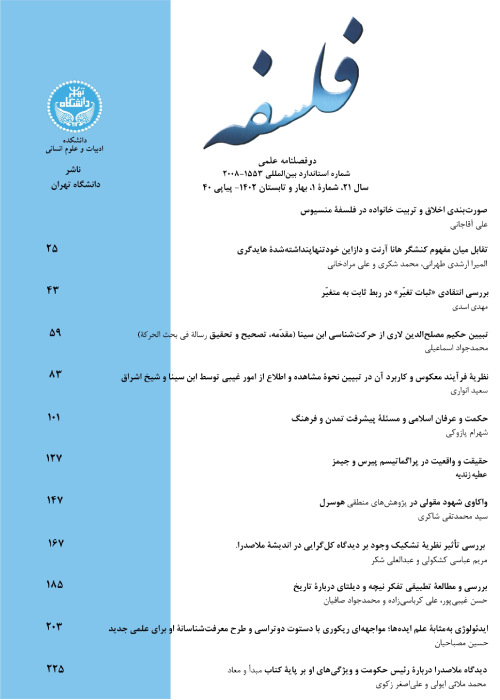Comparison of the Narrative of the Sacrifice of Son by Abraham in Ibn ʿArabī's Mysticism and Kierkegaard's Existentialist Attitude
Author(s):
Article Type:
Research/Original Article (دارای رتبه معتبر)
Abstract:
Sacrifice of Isaac by the command of God and by the hand of Abraham is a common narrative between Judaism, Christianity and some sects of Islam. In addition to Muslim and Christian sages and theologians such as Ibn ʿArabī', Kierkegaard, Augustine and Aquinas, this narrative has also attracted the attention of philosophers such as Thomas Hobbes, Kant, Hegel, Emmanuel Levinas and Derrida. Verses 1 to 19 of Chapter 22 of the Torah Genesis are the narration of Jehovah's command to Abraham to sacrifice Isaac. A command that Abraham, together with Isaac and his two slaves, traveled a three-day journey to Mount Moriah to fulfill, and just when Abraham took out the knife to slaughter his son, Jehovah's angel called him from the sky and forbade him to perform the sacrifice. Some church fathers, such as Clement and Tertullian, considered this story to be a prototype of Jesus' ascension to the cross. The explicit mention of the covenants and especially Paul's emphasis on the eternal power of God on the one hand and Abraham's faith in this absolute power that can bring even a slaughtered and dead child back to the arms of the father, and also Abraham's faith and suffering in this test are at the center Kierkegaard's attention and reflection are placed in various works such as Repetition, Either/Or, and especially Fear and Trembling. In the Holy Quran, the clearest reference to this narration is in verses 101 to 113 of Surah "As-Saaffat". This essay focuses on the religious-mystical thoughts of Ibn ʿArabī', a famous Muslim mystic, and Søren Kierkegaard, a Danish philosopher and theologian, who is mentioned as the founder of existentialism, compares Abraham's divine experiment to son sacrifice in Christian and Islamic narratives as the focus of his research. Ibn ʿArabī' in Isaac section of Fusus al-hikam (The bezels of wisdom) and Kierkegaard in the book of Fear and Trembling have attempted to interpret the divine experiment of Abraham. The main question of the research is the foundations and principles influencing the thought of Ibn ʿArabī' and Kierkegaard in the interpretation of the mentioned narrative. The results of the research show that the difference between the views of Ibn ʿArabī' and Kierkegaard is the type of view that each of them have on man and his place in the order of creation. The difference of opinion based on which is Abraham, the knight of faith and a believer in the “strength of absurd” in Kierkegaard's view and rejected in the interpretation of Isaac's face as a sheep according to Ibn ʿArabī'. Using the comparative method and relying on the data collected through library sources, this paper first compares the position of man in the thought system of Ibn ʿArabī' and Kierkegaard and then studies the opinions of both of them about the narrative of Isaac's sacrifice.
Keywords:
Language:
Persian
Published:
Philosophy, Volume:50 Issue: 2, 2023
Pages:
113 to 133
magiran.com/p2535504
دانلود و مطالعه متن این مقاله با یکی از روشهای زیر امکان پذیر است:
اشتراک شخصی
با عضویت و پرداخت آنلاین حق اشتراک یکساله به مبلغ 1,390,000ريال میتوانید 70 عنوان مطلب دانلود کنید!
اشتراک سازمانی
به کتابخانه دانشگاه یا محل کار خود پیشنهاد کنید تا اشتراک سازمانی این پایگاه را برای دسترسی نامحدود همه کاربران به متن مطالب تهیه نمایند!
توجه!
- حق عضویت دریافتی صرف حمایت از نشریات عضو و نگهداری، تکمیل و توسعه مگیران میشود.
- پرداخت حق اشتراک و دانلود مقالات اجازه بازنشر آن در سایر رسانههای چاپی و دیجیتال را به کاربر نمیدهد.
In order to view content subscription is required
Personal subscription
Subscribe magiran.com for 70 € euros via PayPal and download 70 articles during a year.
Organization subscription
Please contact us to subscribe your university or library for unlimited access!


